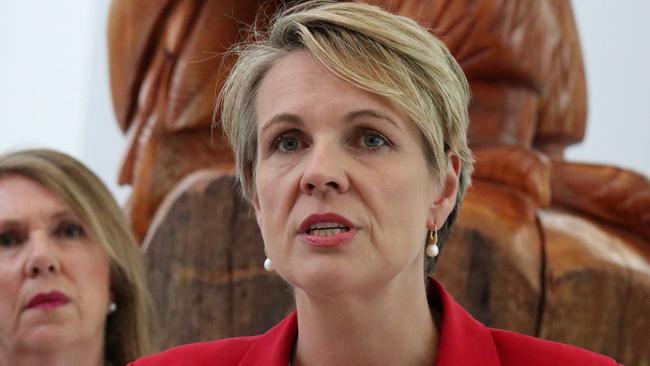Tax system discriminates against women: Tanya Plibersek
Tanya Plibersek says Australia’s tax system discriminates against women, citing the GST on tampons and the gender pay gap.

Labor deputy leader Tanya Plibersek says Australia’s tax system discriminates against women, citing the GST on tampons and the gender pay gap as examples.
Ms Plibersek’s comments come after Labor treasury spokesman Chris Bowen defended his claim that men will benefit more than women from Stage Three of the government’s income tax cut package, arguing it is fair to consider the gender pay gap when debating tax policy.
Mr Bowen yesterday highlighted a Parliamentary Budget Office finding that $30 billion of the $41.6bn of Stage Three tax cuts would flow to men, claiming men would benefit over women at a ratio of three to one.
Stage Three of the tax cut plan would see the 37 per cent income tax bracket abolished in favour of a 32.5 per cent rate for all incomes of between $41,000 and $200,000 from July 2024.
Ms Plibersek said it was “very interesting” that Mr Morrison believed the tax system was gender-neutral.
“We know that we have a gender pay gap in Australia. We know that women are retiring with substantially lower superannuation balances than men, and we’ve got a government that says that this is all gender-neutral, nothing to see here,” Ms Plibersek said.
“We’ve got a government that had members last week that there should be a cut to the GST on superyachts, but they refuse to back a cut to the GST on tampons. “We’ve got a government that says tampons should attract the GST but Viagra should not.
“That doesn’t look gender neutral to me, and perhaps if they had a few more women on the Coalition frontbench they’d realise that these policies are not gender-neutral.”
Gender a “fair” consideration: Bowen
Mr Bowen told a press conference today that he was pointing out that the PBO’s analysis had shown the “overwhelming benefit” of the Stage Three tax cuts went to men.
“That’s a statement of fact. Now you can say that that’s not relevant to your considerations, fair enough, I respect your right to make that assertion,” Mr Bowen said.
“I think there’s plenty of women who might say they wouldn’t mind knowing that information, thanks very much, when they consider their position on the issue. More information is hardly ever a problem.”
Earlier, Mr Bowen said he believed the impacts of tax policy on men and women were “fair enough considerations”.
“I’m not saying it’s the only consideration. There’s been a lot of talk about these Phase Three tax cuts and who they benefit,” he told 2GB.
“The Treasurer’s been out there saying it benefits this occupational group and that profession. Well he can do that, and I think we’re right to also point out that, hang on a second, of these Stage Three tax cuts they do overwhelmingly benefit men.
“People are going make their own judgment about that, but I think it’s fair enough to go through all the facts and the information.”
Asked whether he was saying the tax schedule shouldn’t be reformed if one gender was going to benefit more than another, Mr Bowen said he was simply saying there was a gender pay gap in Australia.
“There is. Women earn less. Women are in overwhelmingly lower paid occupations and they have career breaks because they’re bringing up children, et cetera, and that in particular is something that worries me a lot, and might worry a lot of your listeners,” he said.
“That in particular compounds over a working life to mean that many more women are retiring into poverty. We want Australians retiring into a dignified retirement.
“Many more women are retiring into poverty, and when you’ve got that gender pay gap, I think it’s fair enough to examine and consider the implications of tax changes and other government policies on women.”
Asked whether he was saying income tax rates couldn’t be lowered because the impact might hurt women, Mr Bowen said he was merely saying that income tax cuts needed to be targeted very carefully.
“As you know, we talked about it last week, we have bigger income tax cuts than the government in the shorter term,” he said.
“We have another round of tax cuts that we’re offering in 2019, which the government isn’t offering, and they oppose. They are targeted at those people earning less than $125,000.
“We think they’re the people who need the most relief at the moment, people earning less than $125,000, men and women, all Australians earning less than $125,000 need that tax relief right now.
“Everybody would like to pay less tax, but we have to look at how expensive it is.”




